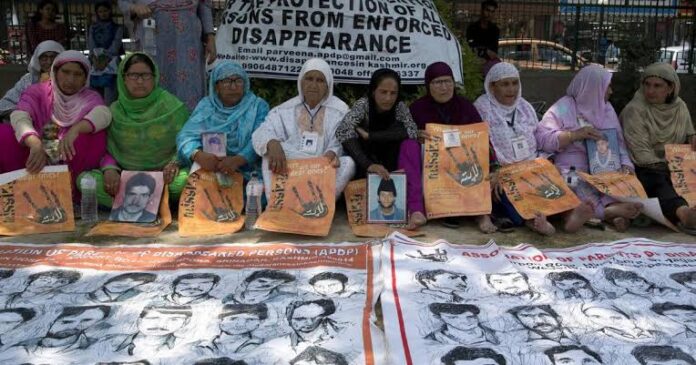On 31st October 2019, when the Indian-occupied valley of Jammu and Kashmir was made into a union territory, the Modi government disposed of a large number of laws that were unique only to the valley but among the few that were retained was AFSPA – Armed Forces Special Powers Act, 1958. This Act gives the Indian Army special immunity to prosecution, in other words, it is allowed to shoot or arrest people whenever it feels like and still go scot-free.
As per this act, the army can detain any suspect and fire upon anyone in a “disturbed area” acting in “contravention of any law or order for the time being in force… even to the causing of death”.
The occupier does not even stand by its own crooked laws. Abusing this Act, along with others such as UAPA and PSA, the Indian army has been involved in forcibly and arbitrarily disappearing people. Since the inception of insurgency in 1990, J&K has seen over 8000 enforced disappearances. The AFSPA faces global condemnation for its role in human rights abuses, torture, arbitrary detentions and extrajudicial killings. The HRW and the UN Human Rights Council while focusing on the tortures and enforced disappearances have criticized India’s repressive designs and blatant infringement of human rights but India has been dismissing these criticisms and reports as its internal matter.
The other matter tied to this issue is unmarked mass graves which are largely believed to be the final destinations of many of the missing persons. In an analysis published in August 2011 by the Jammu and Kashmir State Human Rights Commission (SHRC), it was reported that there were 2,156 unidentified bodies in ‘mass graves’.
Following the mass disappearances, a group came together as Association of Parents of Disappeared People (APDP) and started organizing silent protests near the Press Enclave in Srinagar. The families awaiting the return of their missing relatives were assisted by the APDP and the Jammu Kashmir Coalition of Civil Society (JKCCS) before the two organizations were disbanded in 2020 and 2021 by the NIA (National Investigation Agency).
The puppet J&K government acknowledges these enforced disappearances but not the number released by these independent organizations with conflicting accounts of its own.
One recent case is that of Abdul Rashid Dar, a 33 year old main wage-earner of his family with virtually no criminal record. He was taken out of his house in the dead of a cold December night of 2022, carried away in an army minivan and since then, the family has not seen him. On the day following his arbitrary detainment, the army sent out the news that Dar had allegedly fled during custody while he was being taken for a ‘militant hideout’ search in a forest, which is hardly credible since the forest was searched and there was nothing to see there.
Abdul Rashid Dar’s arrest and disappearance is a farce even for the AFSPA, as the army conducted the detainment itself, did not inform and did not hand over ‘the suspect’ within 24 hours to the local police which it was required to.
Meenakshi Ganguly, South Asia director for Human Rights Watch (HRW), a global human-rights advocacy, said the army was primarily responsible for Rashid’s disappearance.
“The army cannot shrug off responsibility by saying a suspect fled,” said Ganguly. “And considering numerous accounts of torture and unlawful deaths by the military, it is crucial that there is an independent investigation.”
This one from among the thousands of cases is yet another call to the protagonists of justice globally. The Indian occupied valley of Kashmir is calling out, the mothers await their beloved sons’ return and the families of the innocent languishing in jails are looking up to the free, modern world. Will the world pay heed?






